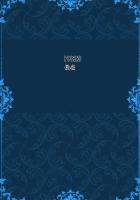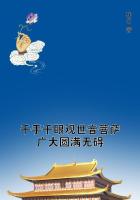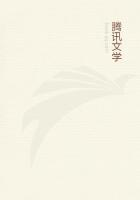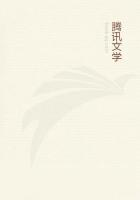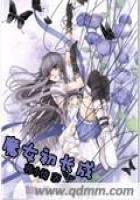Then Zal yet again bethought him before he said-"Hear of the sea-born cypresses, Where builds a bird, and rests, and flees. From the Ram to the Scales the earth o'erpowers, Shadows obscure of the night that lowers, But when the Scales' sign it must quit, Darkness and gloom o'ermaster it; The sides of heaven thy fable shows Whence grief to man or blessing flows, The sun like a bird flies to and fro, Weal with him bringing, but leaving woe."
Then the sixth Mubid questioned him, and it was the last question that he asked, and he deemed it the hardest of all to answer. And all men hung upon his words and listened to the answer of Zal. And the Mubid said-"Builded on a rock I found A town. Men left the gate and chose A thicket on the level ground. Soon their soaring mansions rose Lifting roofs that reach the moon, Some men slaves, some kings, became, Of their earlier city soon The memory died in all. Its name None breathed.
But hark! an earthquake; down, Lost in the chasm lies the land- Now long they for their rock-built town, Enduring things they understand.
Seek in thy soul the truth of this; This before kings proclaim, I was, If rightly thou the riddle rede, Black earth to musk thou hast changed indeed."
And Zal pondered this riddle but a little while, and then opened his mouth and said-"The eternal, final world is shown By image of a rock-built town;
The thicket is our passing life, A place of pleasure and of pain, A world of dreams and eager strife, A time for labour, and loss, and gain; This counts thy heart-beats, at its will Prolongs their pulse or makes it still. But winds and earthquake rouse: a cry Goes up of bitterness and woe, Now we must leave our homes below And climb the rocky fastness high. Another reaps our fruit of pain, That yet to another leaves his gain; So was it aye, must so remain. Well for us if our name endure, Though we shall pass, beloved and pure, For all the evil man hath done, Stalks, when he dies, in the sight of the sun; When dust is strown on breast and head, Then desolation reigns with dread."
When Zal had spoken thus the Shah was glad, and an the assembly were amazed, and lauded the son of Saum. And the King bade a great banquet be prepared, and they drank wine until the world was darkened, and the heads of the drinkers were troubled. Then when morn was come Zal prayed that the Shah would dismiss him. But Minuchihr said-"Not so, abide with me yet another day," and he bade the drums be beaten to call together his heroes, for he desired to test Zal also in feats of strength. And the Shah sat upon the roof of his house and looked down upon the games, and he beheld Zal, the son of Saum, do mighty deeds of prowess. With his arrow did he shoot farther and straighter than the rest, and with his spear he pierced all shields, and in wrestling he overcame the strongest who had never known defeat.
When the nobles beheld these doughty deeds they shouted and clapped their hands, and Minuchihr loaded Zal with gifts. Then he prepared a reply unto the letter of Saum. And he wrote-"O my Pehliva, hero of great renown, I have listened to thy desires, and I have beheld the youth who is worthy to be thy son. And he hath found favour in my sight, and I send him back to thee satisfied. May his enemies be impotent to harm him."
Then when the Shah had given him leave to go, Zal set forth, and he bare his head high in the joy of his heart. And when he came before his father and gave to him the letter of the Shah, Saum was young again for happiness. Then the drums sounded the signal to depart, and the tents were prepared, and a messenger, mounted on a fleet dromedary, was sent unto Mihrab to tell him that Saum and Zal were setting forth for Cabul. And when Mihrab heard the tidings his fears were stilled, and he commanded that his army be clad in festal array. And silken standards of bright colour decked the city, and the sounds of trumpets, harps, and cymbals filled the air. And Sindokht told the glad tidings to Rudabeh, and they made ready the house like unto a paradise. Carpets broidered with gold and precious stones did they lay down upon its floors, and set forth thrones of ivory and rich carving. And the ground they watered with rose-water and wine.
Then when the guests were come near unto Cabul, Mihrab went forth to meet them, and he placed upon the head of Zal a crown of diamonds, and they came into the city in triumph. And all the people did homage before them, and Sindokht met them at the doors of the King's house, and poured out musk and precious stones before them. Then Saum, when he had replied to their homage, smiled, and turned to Sindokht and said-"How much longer dost thou think to hide Rudabeh from our eyes?"
And Sindokht said, "What wilt thou give me to see the sun?"
Then Saum replied, "All that thou wilt, even unto my slaves and my throne, will I give to thee."
Then Sindokht led him within the curtains, and when Saum beheld Rudabeh he was struck dumb with wonder, for her beauty exceeded dreams, and he knew not how he could find words to praise her. Then he asked of Mihrab that he would give unto him her hand, and they concluded an alliance according to custom and the law. And the lovers were seated upon a throne, and Mihrab read out the list of the gifts, and it was so long the ear did not suffice to hear them. Then they repaired unto the banquet, and they feasted seven days without ceasing. And when a month had passed Saum went back to Seistan, and Zal and Rudabeh followed after him. And speedily did he set forth again to battle, and left the kingdom in the hands of his son, and Zal administered it with wisdom and judgment. And Rudabeh sat beside him on the throne, and he placed a crown of gold upon her head.

